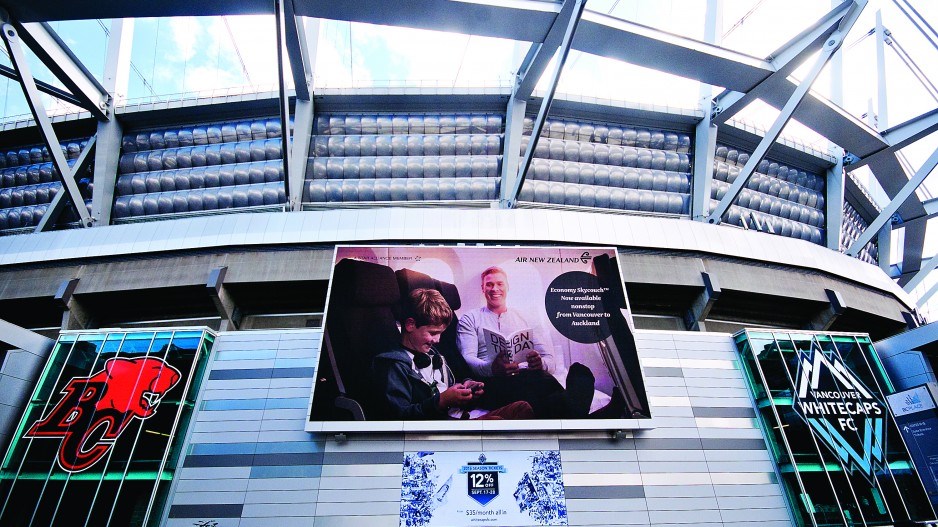The Vancouver Whitecaps’chief operating officer has refused to publish the team’s actual home game attendance, despite an adjudicator ordering BC Pavilion Corp. (PavCo) to provide the figures under Freedom of Information.
“We always focus on publishing our assigned seat numbers because it’s the best reflection of the number of seats that are allocated for every game, and it reflects how the market is responding,” Rachel Lewis said in an interview. “We’ll plan to continue to announce that way.”
Since BC Place Stadium reopened from its $512 million renovation in September 2011, the Whitecaps and BC Lions have overstated attendance by a combined 500,000 fans. But, after a three-year legal battle, the Office of the Information and Privacy Commissioner (OIPC) ordered stadium management to release the actual counts.
The total announced by the Whitecaps at games from October 2011 to March 2016 was 1.67 million. Figures released by PavCo, and analyzed by Business in Vancouver, show the actual attendance count by the stadium’s staff was 1.41 million for the 84-game period. The BC Lions claimed 1.38 million over 47 games, but drew 1.14 million.
Both teams insist on announcing the number of tickets distributed rather than the number of people who come to games and have their tickets scanned at the gates. OIPC adjudicator Celia Francis rejected the teams’ joint submission because they had no proof that their businesses would suffer if the public knew the true attendance numbers.
“By the Whitecaps and BC Lions’ own admission, in such situations, ‘it is readily apparent that not all seats are occupied’ and ‘it is obvious to the public that the announced attendance does not purport to be actual attendance’,” Francis wrote. “If these things are obvious to the public, I conclude that they are also obvious to the sponsors and broadcasters about whom the BC Lions and the Whitecaps expressed concern.”
The Whitecaps enjoyed their best Major League Soccer (MLS) year in 2015, averaging 17,649 and drawing an actual total of 384,334. That was less than the 446,536 announced.
The club announced 38 crowds of 21,000 or better between October 2011 and March 2016, but it broke that threshold just once in each of the 2014 and 2015 regular seasons and again in its first MLS home playoff game: a 24,485 crowd last November 8 when the Portland Timbers visited.
The Lions drew 126,994 to the four post-renovation regular season games in 2011, an average of 31,748. The team won its sixth Grey Cup at home in front of 50,830, which had been announced as 54,313.
Last season, the club was forced by the FIFA Women’s World Cup to play its home exhibition game at Thunderbird Stadium, and it suffered further at the gate when the league scheduled two Thursday home games in August. It struggled to a 7-11 record and drew 144,545 over nine regular season games, a full-season average of 16,060.
The rejuvenated Lions are aiming for a comeback in 2016 with the return from retirement of Canadian Football Hall of Fame coach Wally Buono, stylish new Adidas (ETR:AG) uniforms and a $5 children’s ticket promotion for the June 25 home opener.
The PavCo service plan report said increased attendance drives higher food and beverage sales at the stadium. Management began an “attendance-building” initiative in 2014-15 by joint marketing with the Lions and Whitecaps and updating the food and beverage menu. From 2011-12 to 2014-15, PavCo lost more than $37 million on operations at BC Place and the Vancouver Convention Centre. It forecast another $7.5 million in red ink for 2015-16. PavCo targeted 1.258 million BC Place attendees for 2015-16, the fiscal year that included the Women’s World Cup, but budgeted for a decrease to 1.086 million by 2017-18.
PavCo chairman Stuart McLaughlin and CEO Ken Cretney did not respond to interview requests. Stone claimed in a May 7, 2015, budget estimates hearing that actual attendance is “always disclosed” annually by PavCo, but the fine print in its report says that the attendance figures are the sum of what is announced by show managers.At an April 28 committee hearing, Stone would not discuss the state of negotiations to renew the Lions’ and Whitecaps’ contracts, citing “commercial confidentiality.”
The new contracts will eventually be subject to public disclosure. The OIPC ordered the release of the Lions’ contract in early 2015. It showed PavCo charges the Leos nothing for the first $9 million of net ticket sales but charges royalties ranging from 10% to 20% on subsequent increments of $1 million.
Figures released under FOI show the Lions paid $986,112 rent to host games in the stadium since the renovation, averaging $20,981 per game. The club also paid $1 million to use level-three suites. The Whitecaps were charged $1,279,884 for game rental for the same period, a $15,237 average, plus $774,000 for suites.
By comparison, in 2013, the non-profit BC Secondary Schools Football Association was charged $20,181 to rent the stadium for the annual November 30, 2013, Subway Bowl championship game.




